Got a speeding ticket and want to fight it? This guide gives you the straight facts on how to mount a defense against your speeding ticket. You’ll learn about questioning the officer’s evidence, using legal strategies, and other options that might keep your driving record clean and your wallet intact. Get ready to arm yourself with knowledge and take on your ticket with confidence, as we explore how to a fight speeding ticket effectively.
Key Takeaways
- Properly analyzing and challenging the details of a speeding ticket, such as the method of speed measurement and accuracy of the officer’s account, is essential in crafting a strong legal defense.
- Understanding strategies for fighting traffic tickets is crucial, including the significance of a strong legal defense supported by evidence. This encompasses the importance of knowing the specific traffic law code section related to the citation and employing reliable defense strategies.
- Alternatives to court battles, like traffic school and plea bargaining, offer opportunities to potentially dismiss the ticket or reduce the penalties, while mitigating the impact on driving records and insurance rates.
- The true cost of a speeding ticket extends beyond the base fine, with additional court fees and potential long-term auto insurance rate hikes that can financially burden drivers for years.
Understanding Your Speeding Ticket and Its Implications
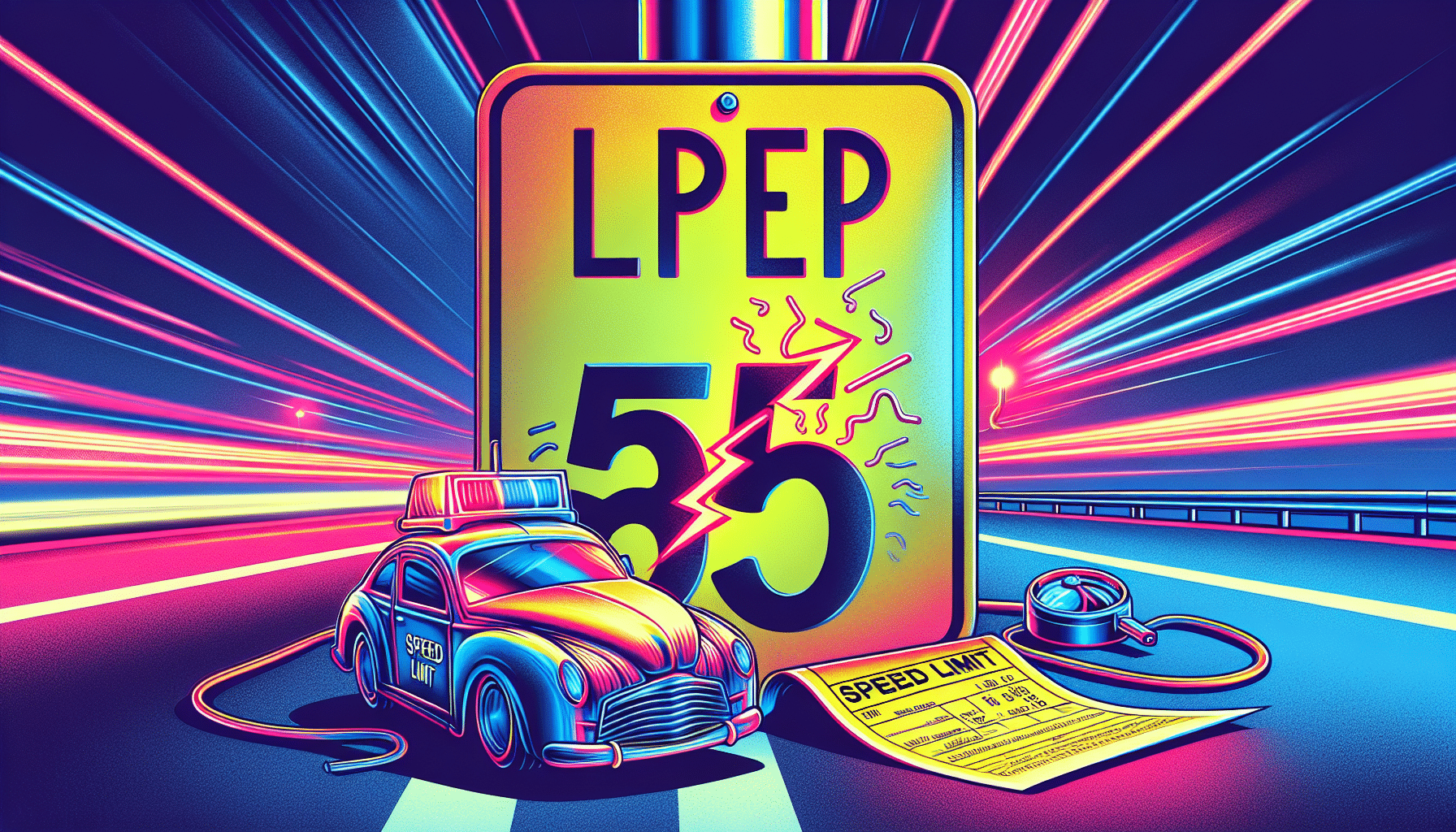
A speeding ticket in California is more than just a slap on the wrist. It’s a direct consequence of committing a traffic violation, specifically violating the traffic laws that regulate speed limits in the state. Whether you were cruising at 70 miles per hour on the highway or navigating a two-lane undivided highway at 55 miles per hour, exceeding the speed limit can result in a traffic ticket, and accumulating speeding tickets can lead to severe penalties.
But the implications of a speeding ticket extend beyond the immediate annoyance and financial burden. A traffic ticket can impact your driving record, influencing your car insurance rates and driving privileges. Deciphering the alleged violation and comprehending its impact on your driving privileges will help you better understand these implications.
Deciphering the Alleged Violation
Analyzing the details of your speeding ticket is the first step in building a defense strategy. The citation will indicate the method used to measure your speed, often using devices like radar guns. It’s also critical to factor in any external circumstances that could have influenced the alleged violation, such as malfunctions on your vehicle’s odometer or speedometer, or ongoing construction work.
Determining your guilt or innocence involves considering several elements, including:
- the role of the police officer in the incident, including analyzing details to determine guilt, requesting the officer’s notes, and presenting evidence in court
- speed detection devices
- witnesses
- the accuracy of the recorded vehicle information
Successfully contesting your speeding ticket requires a thorough understanding of these factors.
Impact on Your Driving Privileges
The fallout from a speeding ticket isn’t just a momentary inconvenience. In states like California that operate a points system, traffic violations can accumulate points, leading to a potential license suspension for a state-specific period. A speeding ticket in California can linger on your driver’s license for three years for minor violations and up to ten years for more serious infractions.
This accumulation of points can lead to the suspension of your driving privileges, with the impact lasting for several years depending on the severity of the traffic violations. Comprehending your speeding ticket and its implications is crucial before you begin to fight back. Armed with this knowledge, you can proceed to craft a strong legal defense.
Crafting a Strong Legal Defense
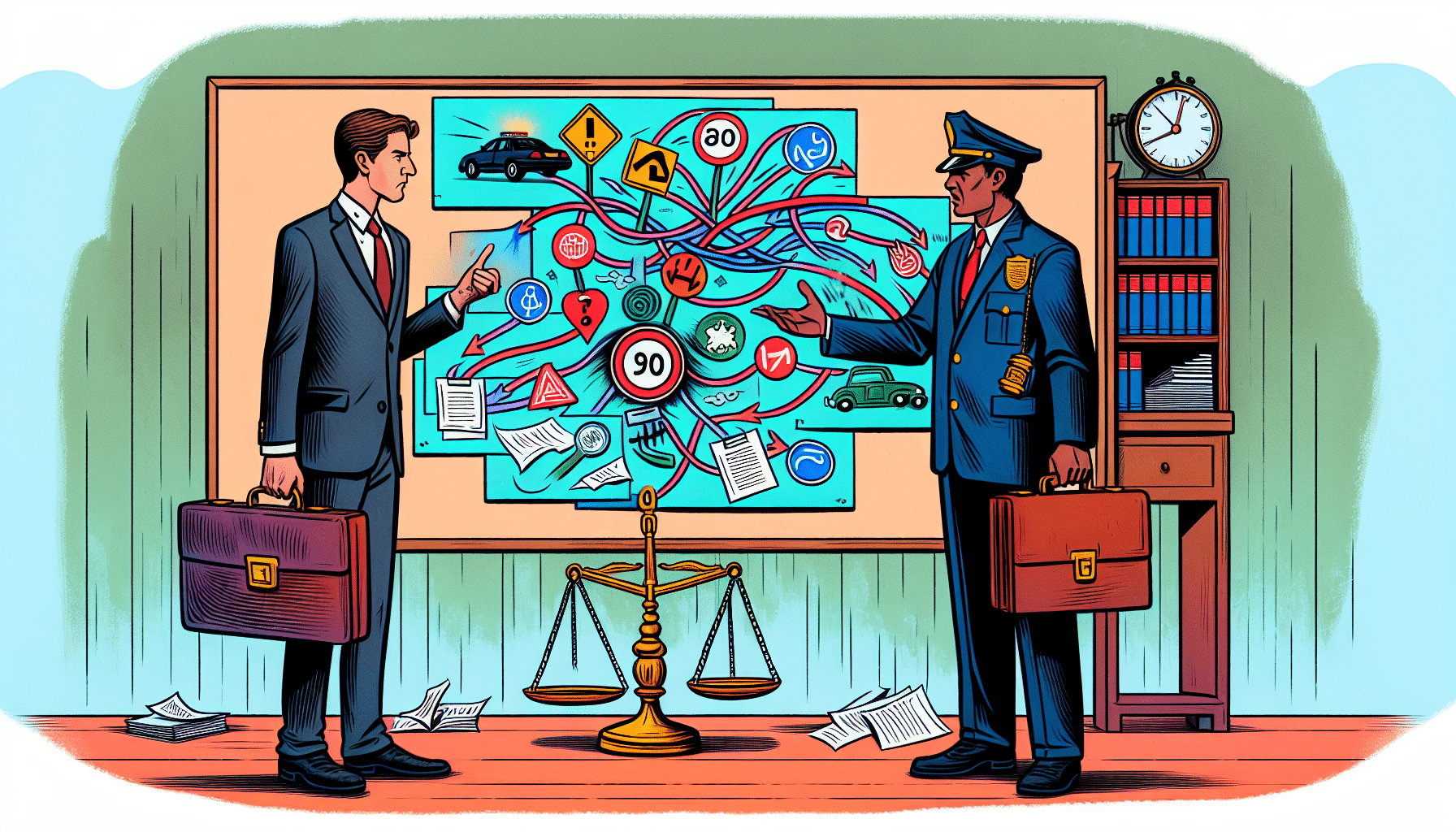
Now that you’ve deciphered your alleged violation and its impact on your driving privileges, it’s time to build your legal defense. Start by examining the citation details and understanding the specific traffic law you’re accused of violating. The key to a successful defense lies in your ability to challenge the officer’s judgment and introduce evidence that may cast doubt on their ability to accurately observe the violation. Understanding the specific traffic law code section related to the citation and having a general overview of five reliable defense strategies for fighting traffic tickets is crucial for a strong legal foundation.
Whether you’re citing a ‘mistake of fact’, or presenting justification for your driving actions, crafting a solid defense requires strategic planning and thorough preparation. We’ll delve deeper into the process, beginning with the not guilty plea.
The Not Guilty Plea
Pleading not guilty is a strategic move often employed in traffic court. In California, drivers can choose to plead not guilty by requesting a trial by written declaration, thus avoiding the need to appear in court physically. This approach allows you to contest the speeding ticket without the pressure of a courtroom setting.
But before you make your plea, you’ll need to prepare a clear argument for contesting your speeding ticket. Keeping detailed records of all discovery requests and court interactions is vital, as this could be crucial if the case is dismissed due to prosecution’s non-compliance.
Challenging the Officer’s Evidence
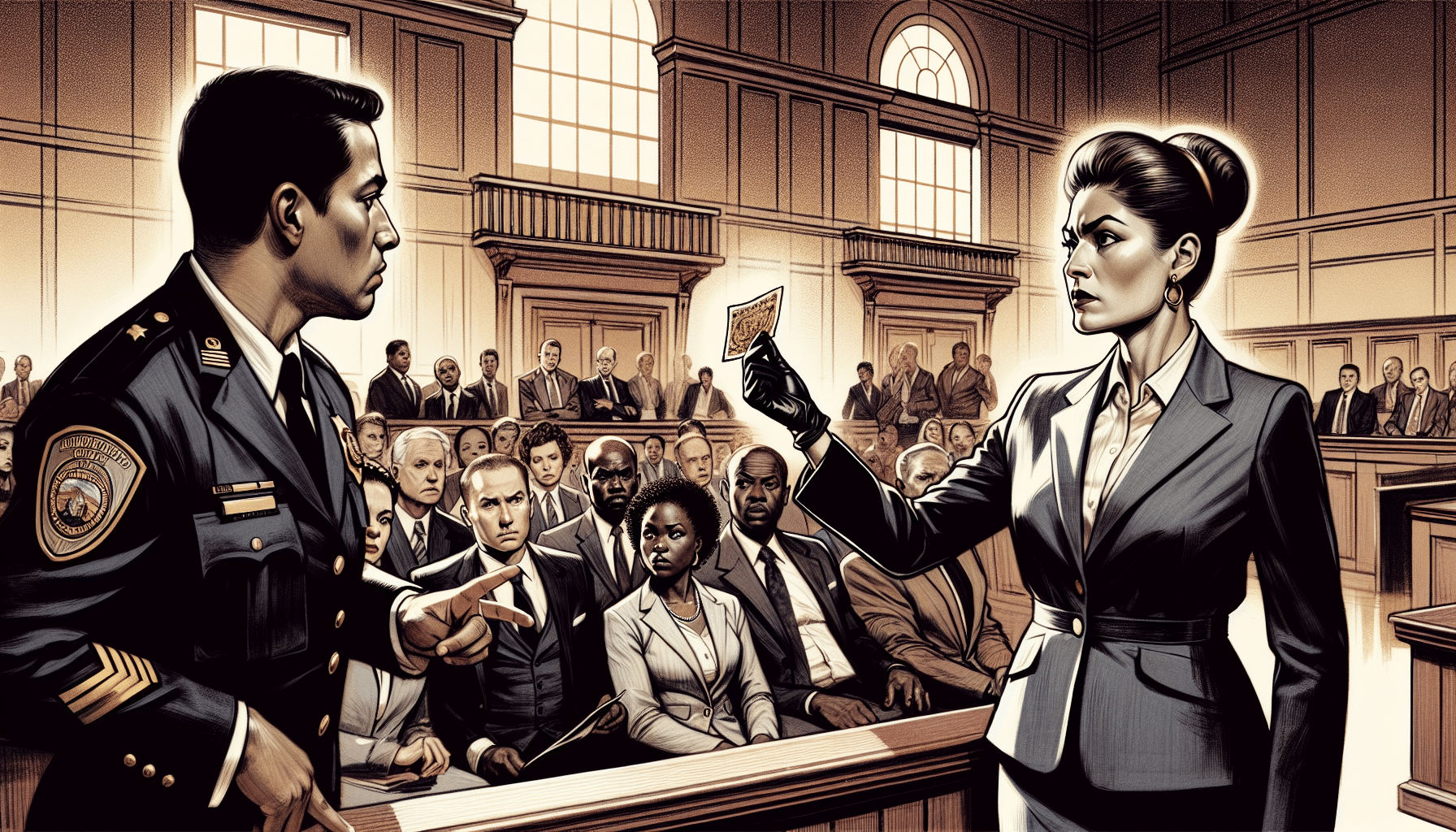
Challenging the officer’s evidence is a critical part of your defense strategy. This involves:
- Disputing the accuracy of the officer’s account
- Exposing any discrepancies in their version of events
- Establishing reasonable doubt in the mind of the judge.
Understanding the police officer’s role in the evidence collection process is essential, as leveraging this knowledge when presenting your case in court can significantly impact the outcome. This includes analyzing the details of the incident to determine guilt, requesting the officer’s notes, and considering the officer’s role when asking for witness testimony.
One method for challenging an officer’s evidence is to contest their judgment of your speed based on the road and traffic conditions. Familiarity with the officer’s abbreviations and notes can also expose inconsistencies or gaps in their testimony, bolstering your case.
Initiating the discovery process is crucial as it helps to obtain evidence like the officer’s notes, assisting in planning your defense and cross-examination.
Seeking Professional Help
While it’s possible to navigate the legal process alone, seeking the counsel of an experienced traffic ticket attorney can make a significant difference. An attorney’s skilled negotiation and understanding of the law and legal procedures can determine the best course of action.
Attorneys can also appear in court on your behalf, strategically contesting the citation to seek the most favorable outcome. If the prosecution fails to respond to discovery requests, your attorney may file a motion to compel discovery, potentially leading to the dismissal of the case.
Alternatives to Fighting Your Ticket in Court
Fighting your traffic citation in court isn’t always the best course of action. There are alternatives to consider, such as attending traffic school or paying the citation in full or in installments. In some cases, performing community service in lieu of payment might be an option if you qualify financially.
For some driving offenses, attending traffic school can prevent points from being added to your driving record. This option could result in the dismissal of your ticket if certain conditions are met. We’ll further examine these alternatives.
Traffic School: A Path to Dismissal
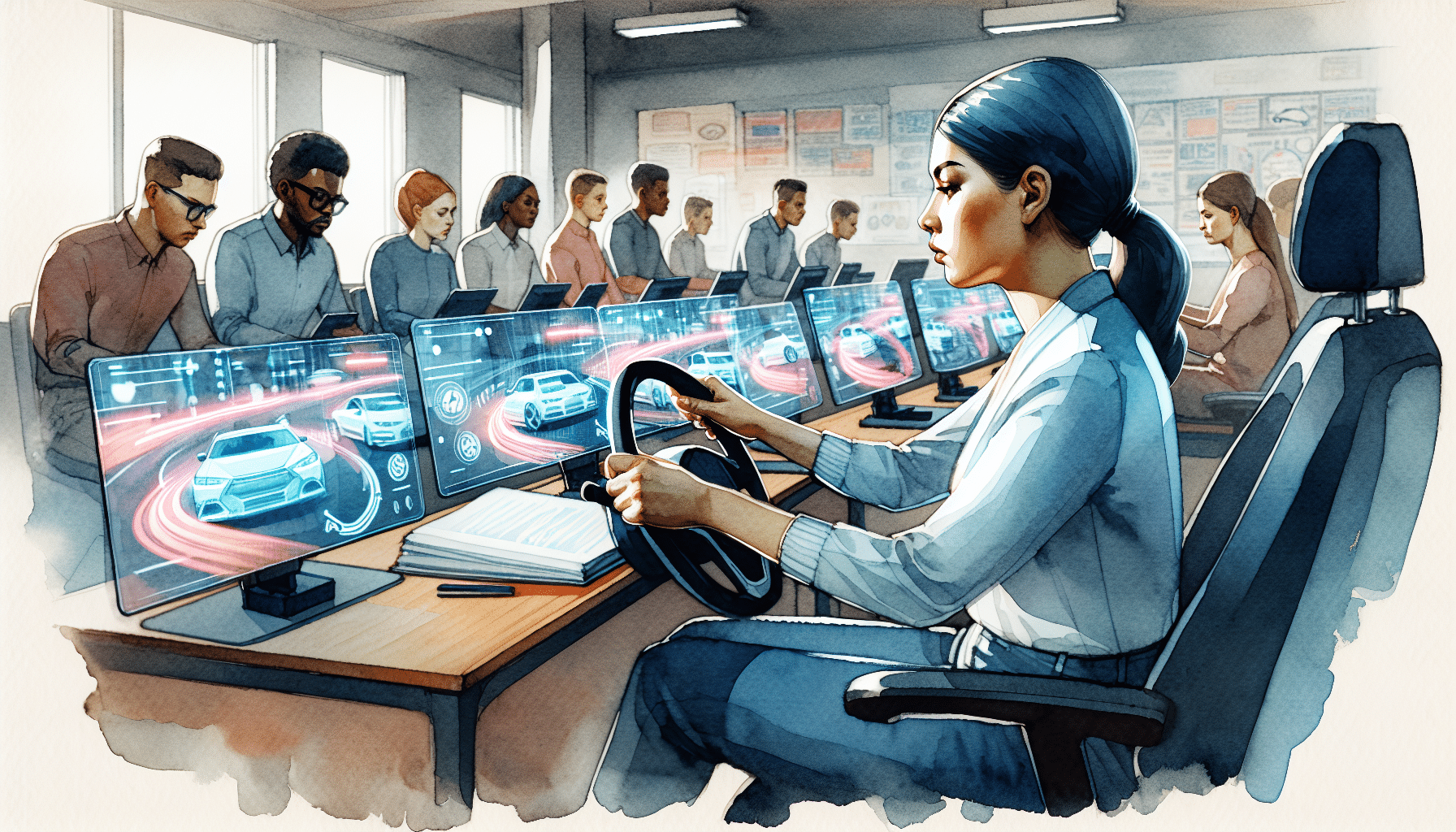
Traffic school isn’t just for novice drivers. In California, eligible drivers can attend traffic school to potentially have their speeding ticket dismissed and avoid points on their driving record. To qualify, drivers must have a valid driver’s license, have committed the offense with a noncommercial vehicle, and not have attended traffic school in the previous 18 months.
But attending traffic school isn’t a free pass. Drivers must pay any required court fee and traffic school fee and successfully complete the course by the deadline given by the court to avoid points on their DMV record. Defensive driving courses can be instrumental in retaining driving privileges by reducing points on your driver’s license.
Negotiating Plea Bargains
Plea bargaining is another strategic option when facing a speeding ticket. It involves the prosecution reducing or dropping charges in exchange for a guilty plea on other charges. Negotiations can lead to reduced charges, such as downgrading an excessive speeding charge to ordinary speeding, or lower fines.
However, it’s important to weigh the potential benefits of a lighter penalty against the risk of admitting fault, which could have other legal consequences. Before accepting a plea bargain, consider the impact on your driving record, insurance rates, and the legal implications of your plea. Once a settlement is reached, its terms must be presented to the judge, who will make the final decision to accept or reject the plea agreement.
The Financial Aspect: Calculating the True Cost of a Speeding Ticket
A speeding ticket in California is not just an unpleasant surprise; it’s a financial burden that can significantly affect your wallet. The true cost of a speeding ticket extends beyond the initial fine and can impact your auto insurance rates. The base cost of a speeding ticket varies depending on how much the speed limit was exceeded and the specific county where the infraction occurred.
But the financial implications of a speeding ticket don’t stop at the base fine. The combination of ticket fines and subsequent insurance rate hikes can differ greatly, especially for violations of excessive speed or tickets received in different counties within California. We’ll further dissect these costs.
Understanding Fines and Fees
The cost of a speeding ticket in California isn’t as straightforward as it might seem. The base fine typically starts at $35 to $100, but this can vary depending on how much you exceeded the speed limit and where you received the ticket. For instance, the average cost for going 20 mph over the speed limit is approximately $367.
However, the base fine is just the beginning. Additional charges, such as assessments for court funding and specific programs, can exceed the base fine, leading to a total cost between $238 and $490. Conditions such as prior traffic convictions or speeding in a construction zone can also elevate the base fine and influence the total cost of a speeding ticket.
Insurance Rate Hikes Post-Ticket
The financial impact of a speeding ticket includes more than just the immediate fines and fees. It can also result in:
- Increased car insurance premiums
- California drivers typically experience a 40% increase in car insurance rates following a speeding ticket
- Average annual insurance cost rise to $3,790
These costs can significantly add up over time.
This increase translates to an average of $1,104 more per year on car insurance for drivers with a speeding ticket in California. That’s a significant financial burden, adding up to thousands of dollars over the years. Understanding these financial implications is crucial in deciding the best course of action when dealing with a speeding ticket.
Preparing for Your Day in Court
Assuming you’ve decided to contest your speeding ticket in court, preparation is key. Your appearance, manner, and presentation can all influence the court’s perception of your case. Showing up in professional attire demonstrates respect for the court and can positively influence the perception of your case.
Understanding courtroom procedures, including the correct times to speak and the proper way to address the judge, is crucial for effective case presentation. Practicing your statement and any responses to potential questions from the judge can help articulate your argument convincingly and reduce nervousness. Before your court date, it’s important to address the significance of documentation and witnesses.
Documentation and Witnesses
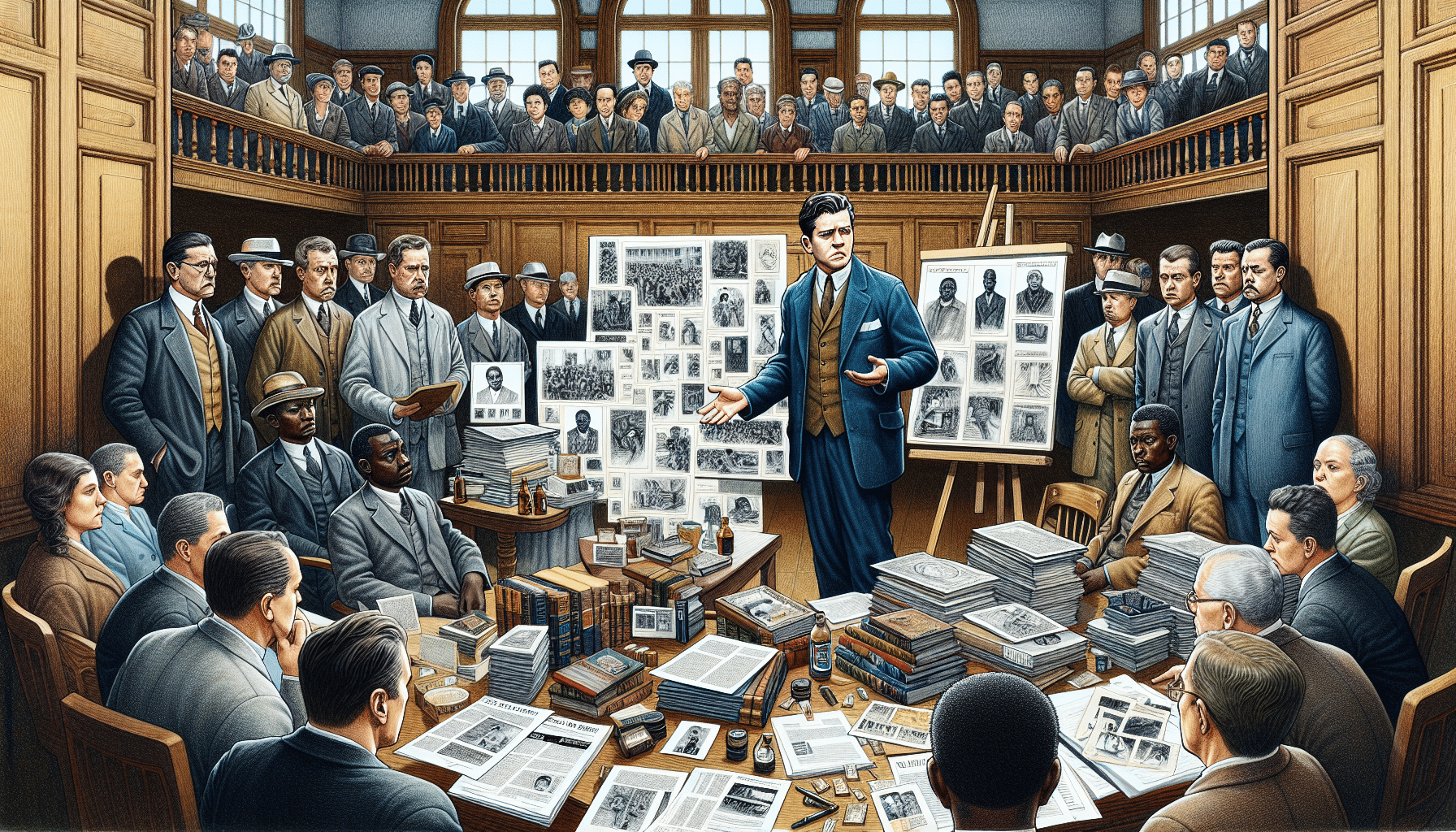
Building a strong defense requires more than just a compelling argument; it requires evidence. Compiling a variety of evidence such as photos of the incident scene, witness statements, and a copy of the speeding ticket can strengthen your case in court.
Witness testimonies can offer pivotal insights and context, which can bolster your defense case by corroborating your account or contradicting the officer’s version of events. Photographs and diagrams of the location, signage, or potential obstructions can provide context to the court and support your argument.
Organizing all the gathered materials systematically can assist in presenting a clear and well-supported argument to the judge.
Presenting Your Case
Once you’ve gathered your evidence and witnesses, it’s time to present your case. Creating a structured outline of your defense argument is essential for a successful and clear presentation in the traffic court.
But an outline isn’t enough. Rehearsing your defense presentation can significantly boost your chances of receiving a favorable judgment by making your argument more persuasive and confident. With thorough preparation and a clear argument, you’ll be ready to stand before the judge and make your case.
Summary
Fighting a speeding ticket in California is more than just a simple contest of right or wrong. It’s a complex process that requires understanding the implications of the ticket, crafting a strong legal defense, weighing alternatives to court, calculating the financial costs, and preparing for your day in court. With the knowledge and strategies outlined in this guide, you are now better equipped to navigate the legal process, whether you choose to fight the ticket in court or explore alternatives. Remember, every situation is unique, and the most successful defense is one that is well-prepared and tailored to your specific circumstances.
Frequently Asked Questions
How much does a speeding ticket in California typically cost?
A speeding ticket in California typically costs between $238 and $490, depending on the specific circumstances.
How much do California car insurance costs increase after a speeding ticket?
Your car insurance costs in California can increase by around 40% after receiving one speeding ticket.
How are California speeding ticket costs determined?
The cost of a speeding ticket in California is determined by the extent of speed limit violation and the county where the ticket was issued. This varies based on the specific circumstances of each case.
How long do points from a speeding ticket stay on your license in California?
Points from a speeding ticket stay on your California driver’s license for three years for minor traffic violations and 10 years for more serious violations. Keep this in mind to understand the impact on your driving record.
What happens if you are going 20 mph over the speed limit in California?
If you are caught going 20 mph over the speed limit in California, you can receive a speeding ticket with a fine of around $367. It’s important to drive within the speed limit to avoid penalties.




